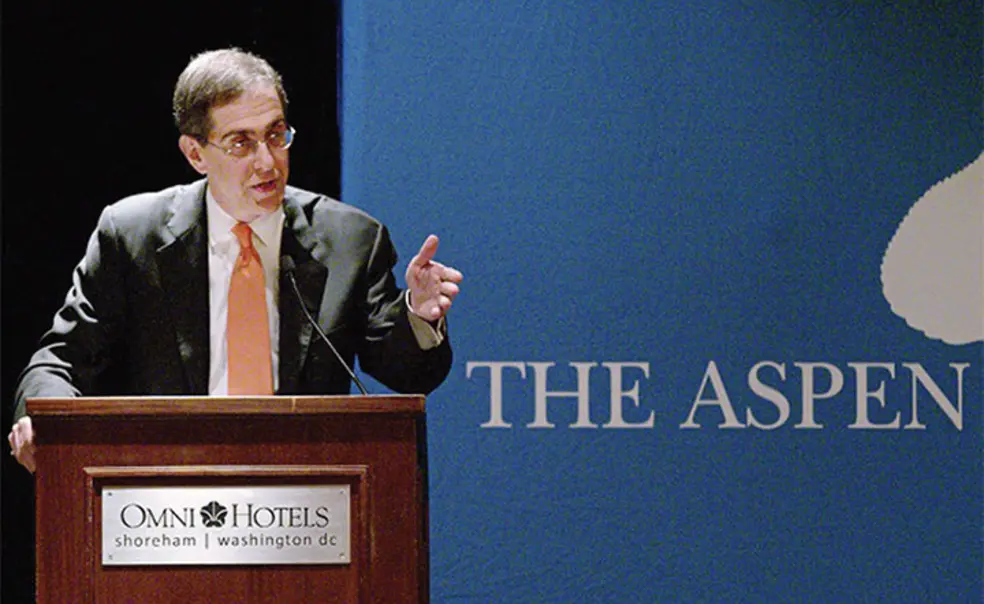Invest in Opportunity
Former Congressman Mickey Edwards, who taught for several years in the Woodrow Wilson School, presides over the Aspen Institute’s Rodel Fellows program. The program brings together up-and-coming office-holders from both parties for seminars designed to bridge partisan differences. At Mickey’s invitation, I addressed a reunion of Rodel Fellows in November. Mickey challenged the speakers to share a non-partisan vision for America’s future. I thought that you might be interested in seeing an abbreviated version of my remarks; the full speech appears at http://www.princeton.edu/president/eisgruber/speeches-writings/archive/index.xml?id=15755.
Shared projects have helped to forge the identity of the American people throughout our history, and tonight I want to urge upon you a shared project. I want to urge you to make a long-term investment in opportunity, and in our children’s shared future.
Let me begin by emphasizing the idea of “investment.” Investments are designed to have a return. You judge investments by their returns, and if you have the freedom and the self-discipline to do so, you judge them by their long-term returns.
Investing wisely is a way to maximize the value of resources. I know that those of you in this room, and the people in this country, disagree about the desirability of government spending. Investing, however, is a special kind of spending. Indeed, we all know from both personal and political experience that we have to limit some spending on the present if we want to have capital to invest for the future.
This country’s greatness has always depended upon our willingness to invest for the long term, and our future depends on our ability to do so again. We must invest in highways and bridges, in hospitals and vaccines, in the power grid, and in the military that keeps our nation and the free world secure. We must invest in schools and in research. We must make investments that allow the individuals, families, and communities of this country to leverage their talent and hard work, and so to magnify the returns that they can produce for themselves and for society.
You know more than I do about highways, bridges, and the power grid. I am not going to say anything further about them. You will not be surprised, I suspect, that I want to say some things about education and, in particular, about universities. I do not intend to talk to you about private universities like my own, or about the need for research funding—though I will be more than happy to bend your ears about those topics on another occasion. I want instead to speak about what should be one of the nation’s most serious concerns today, which is the fate of the great public research universities in all of your states.
America’s flagship public universities are engines of opportunity and drivers of social mobility. They have been admired worldwide, and they have attracted new talent to our shores for generations. If we allow these universities to deteriorate, we will squander an irreplaceable heritage. There is no way that private universities or the private sector more generally can replace what the great public universities do for this country.
Unfortunately, public universities are being asked to do more and more with less and less. Enrollments have increased, and government funding has decreased.
I said earlier that the way to judge an investment is by its return. Education is an investment, and the return is extraordinary. The Federal Reserve Bank of New York estimates the annual return from a four-year college degree today at 15 percent—that number, 15 percent, is the average return across all four-year degrees in all fields from all colleges. The wage premium from a four-year college degree is as high or higher today than it has ever been. And if we add in the non-financial benefits of a college education, the real returns are even higher.
Now, of course, good investments are efficient investments. If we can reduce the price of an investment and generate an equally good return, it becomes a better investment. All universities, including my own, need to look for ways to pursue our missions more efficiently. But efficient education is not the same thing as cheap education.
One of the best ways to increase the efficiency of investment in higher education is to increase completion rates. College degrees produce a high economic return; incomplete coursework does not. But increasing completion rates may require more investment. If public universities lack the resources to staff courses properly, students take longer to graduate, drop-out rates increase, and the return on public investment diminishes.
We must be courageous enough to invest in opportunity, to invest for the long term, to invest in the shared future of all our children. This country has never been simply about what the individual can do, or about what the government can do. From the moment of this country’s founding, Americans have made it their shared project to invest together in opportunity. That basic commitment—the commitment to invest in opportunity— remains vital and alive today. It is a commitment that all of us inherit from our past, and I hope all of you will embrace it as part of our future.












1 Response
Alexander M. Williamson ’61 *62
9 Years AgoHigher Ed Challenges
The March 16 President’s Page, summarizing a recent talk by President Eisgruber ’83, highlights several issues that loom large, in this part of the country at any rate: